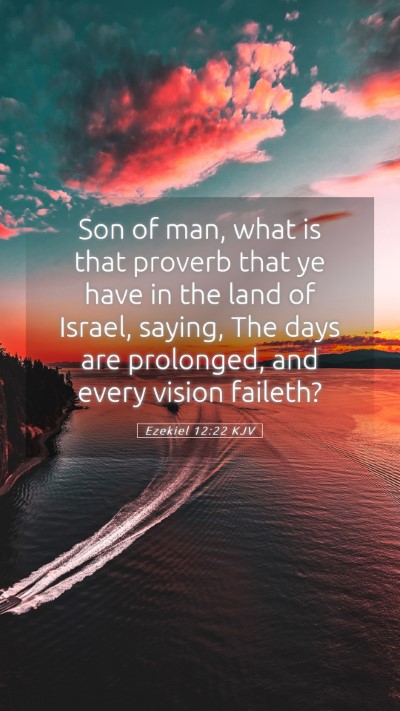Ezekiel 12:22 - Understanding and Commentary
The verse Ezekiel 12:22 states: "Son of man, what is that proverb that ye have in the land of Israel, saying, The days are prolonged, and every vision faileth?" This passage addresses the skepticism regarding the prophecies of judgment against Jerusalem and the delay of fulfillment.
Bible Verse Meanings and Interpretations
This verse encapsulates a profound moment in the prophetic ministry of Ezekiel, where God challenges the complacent attitudes of the Israelites. Below, we explore various insights based on renowned public domain commentaries:
-
Matthew Henry Commentary:
Matthew Henry emphasizes the irony in the use of proverbs among the Israelites to denote their belief that prophecies of impending doom had become irrelevant. The "prolonged days" suggest a sense of apathy towards divine warnings, showcasing humanity's tendency to dismiss prophecy if it does not align with their anticipated timelines.
-
Albert Barnes' Notes on the Bible:
Barnes highlights that this proverb reflects a general disbelief and neglect of the prophetic messages. He explains that the phrase, "the days are prolonged," indicates a false sense of security among the people of Israel, believing that the prophetic warnings would not come to pass anytime soon. Barnes advises readers to recognize the seriousness of God's messages, as procrastination in heedfulness can lead to dire consequences.
-
Adam Clarke's Commentary:
Clarke provides historical context, noting that this statement occurs during a time of great turmoil for Jerusalem. He articulates that the people's lightheartedness about the prophecies reveals a deeper issue: a lack of true repentance and recognition of sin. Clarke sees this verse as a call to sober reflection among those who take lightly the seriousness of God’s warnings.
Key Themes and Understanding
Ezekiel 12:22 serves as a crucial reminder of the role of prophecy within the Bible and calls for an understanding of the urgency communicated by God through His prophets. The key themes include:
-
Divine Urgency:
The plea for the people to consider the weight of the messages from prophets underscores the divine urgency of repentance and action.
-
Human Complacency:
The proverb's existence highlights a human tendency toward complacency and disbelief, especially in matters of judgment and prophecy.
-
Faithfulness of God's Word:
Despite human disbelief, God’s word remains powerful and will ultimately be fulfilled, serving as a cautionary principle for all believers.
Bible Study Insights
For those engaged in Bible study, Ezekiel 12:22 can serve as a focal point of discussion regarding how interpretations of prophecy can vary based on cultural contexts. Here are a few insights:
-
Historical Context:
An examination of Israel's history during Ezekiel’s time reveals a cycle of disobedience, prophecy, and eventual judgment. This informs our understanding of God’s patience and justice.
-
Application to Daily Life:
This verse prompts believers to reflect on the prophecies of Scripture and their relevance today, stressing the importance of living with the awareness of God’s judgment and mercy.
-
Community Discussions:
Engaging in Bible study with groups can enhance understanding as varying perspectives may illuminate aspects of the verse that one might overlook individually.
Significance of Ezekiel 12:22
The significance of this verse extends beyond the immediate context of Ezekiel’s prophecy to resonate with modern readers grappling with issues of faith, expectation, and the fulfillment of God’s promises.
Cross References
To enrich one's study of Ezekiel 12:22 and its themes, consider the following related verses:
- Ezekiel 12:27: Addresses the people's skepticism regarding prophecies.
- Jeremiah 14:13: A parallel reminder of false hopes in prophecy.
- Habakkuk 2:3: Emphasizes that the vision will come and will not delay.
Conclusion
In summary, Ezekiel 12:22 calls attention to the human inclination towards disbelief in prophetic messages, while simultaneously affirming God's unwavering commitment to fulfill His word. In engaging with such verses, readers are encouraged to delve deeply into Scripture for understanding and application in their lives, fostering an enriched faith journey.
For further exploration into the meaning of Bible verses, it is invaluable to utilize Bible study resources safely found in community engagement and robust study tools. Proper Bible verse commentary enables a deeper experience and understanding of God's collective messages throughout history.


